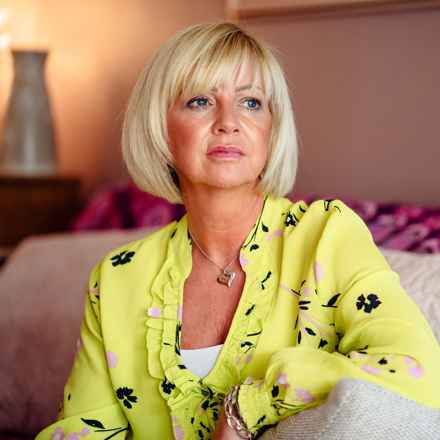“I felt like I lost my identity overnight. But I’m still Marcia, she’s still in there.”
Posted: Monday 20 June 2022
“I’ve always been extremely short-sighted, and worn glasses my entire life – my eyesight was normal with my glasses on. But in 2013 I had very blurred vision in my left eye, lots of floaters.
“Within a fortnight, the vision in that eye had completely deteriorated. Two years later, the same thing happened in my right eye. I went for further tests and was diagnosed with a type of macular degeneration called ‘dome maculopathy’.
“The doctor told me it would keep getting worse, and I would eventually lose my central vision. I hadn’t told anybody I’d gone for any eye tests, not even my husband. I am a palliative care nurse – or I was – and I was working full time.
“Even after the diagnosis, I didn’t tell anyone. I just thought it would be ok, as long as I could still drive. But at a routine eye exam in 2019, I was told “you can’t drive anymore.” I was so upset, and again I kept it to myself, which was silly I know. I just didn’t have time for this, I could still see.
“I needed to get to work. But soon after, I was driving home in the pouring rain and I realised the doctor was right. I could not see well enough to keep driving. So I surrendered my driving licence and that’s when it all came out.
“I finally told my family. My husband couldn’t believe I’d kept it from him, from our sons, my parents. They were all devastated. My mum asked if it was something she’d done before I was born, when she was carrying me, because I’d been short-sighted since birth. “Why didn’t you tell us?” they all said.
“I just wanted to be me. I didn’t want to change, or for my family to see me differently. But I was changing. I wasn’t a nurse anymore. I couldn’t drive. Suddenly I felt like I would be stuck in the house forever. I’d always been a social person, but I began to withdraw and lose myself. Who was I now? What was I to anybody? I felt utterly useless.
“I felt like I lost my identity overnight. But I’m still Marcia, she’s still in there.
“Then I hit that brick wall. You either go over it, you go under it, or you go backwards. I’d been having some really dark days, feeling very down for months; friends were trying to help, but I didn’t want their support, I didn’t want to be a burden. I needed to speak to someone who understood.
“I found the Macular Society online, and I had some counselling. It turned my life around. I realised I never opened up about anything; as a nurse, I was the listener, not the talker. For the first time in my life, I talked about my own issues and how everything was affecting me.
“It’s not about acceptance, it’s about adjustment. Who’s going to accept that they’re losing their eyesight? But we’ve got to have hope. Even my patients in end of life care still had hope. Medical research is developing all the time, and there’s lots of progress being made with macular disease research. I’d put myself out there to help the scientists – “Do it on me!” I’d say.
“My hope is that research will lead to a cure one day and give me back everything I’ve lost. Our eyes are the souls of our hearts, they’re the very being of us. The impact of losing your sight is huge. It’s astronomical. But I am still me, and I will get through every day.
“There are millions of people in the world going through so much right now; I don’t want to paint myself as a victim. I’m living for today and that suits me, because I can go to bed tonight and think I’ve had a pretty good day today. Or I can go to bed thinking today hasn’t been brilliant, but tomorrow may be better.”
Marcia shares her story as part of Macular Week, which runs from Monday 20 June to Sunday 26 June. You can donate to help people like Marcia and fund vital research to find a cure. Donate now.
Do you want to help raise awareness of macular disease? Share your story with us at stories@macularsociety.org
